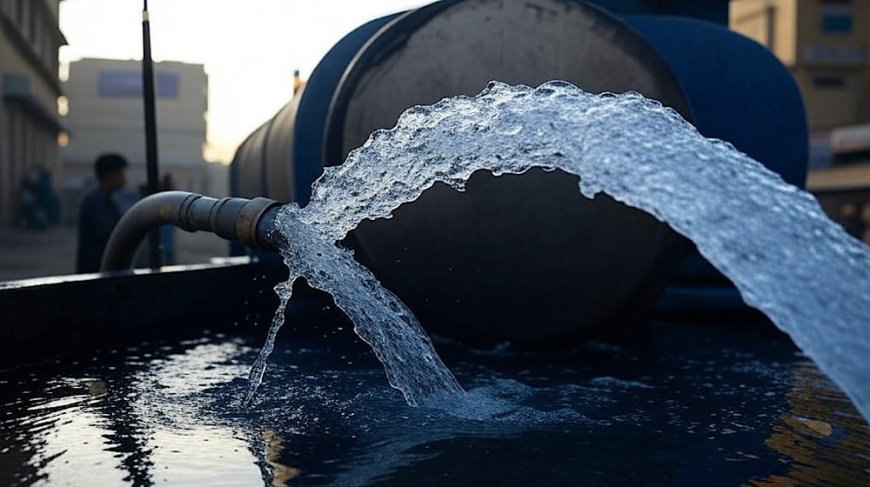Water Projects Worth Rs. 70B Announced for Faisalabad
The Punjab government has greenlit two major water treatment initiatives in Faisalabad, with a combined investment surpassing Rs. 70 billion. These include a Surface Water Treatment Plant (Rs. 14.6B) and a large-scale Eastern Wastewater Treatment Facility (Rs. 56+ B), expected to serve over 700,000 residents in eastern Faisalabad.

The Punjab government has greenlit two major water treatment initiatives in Faisalabad, with a combined investment surpassing Rs. 70 billion. These include a Surface Water Treatment Plant (Rs. 14.6B) and a large-scale Eastern Wastewater Treatment Facility (Rs. 56+ B), expected to serve over 700,000 residents in eastern Faisalabad. The plan will deliver 63 million gallons of clean water daily, and offer recycled water for agriculture, promoting sustainability while boosting public health and groundwater preservation.
-
Two flagship projects were approved in a high-level meeting led by Secretary Noor‑ul‑Amin Mengal.
-
Surface water plant (Rs. 14.6B) to deliver potable water by June 2027.
-
Wastewater plant (Rs. 56B+) to treat sewage water for irrigation use by July 2028.
-
Beneficiaries: Over 700,000 residents, including 56,000 households.
-
Agricultural reuse: Treated wastewater will support farmers and conserve freshwater.
-
Funding: Fully backed by international donor agencies.
-
Future expansion envisages three plants to meet growing city demands.
Faisalabad, Pakistan’s industrial hub, faces water stress from contamination, unreliable supply (6–8 hours/day), and declining aquifers. Residents rely heavily on groundwater, largely unregulated and often unsafe. WASA currently delivers 60% of the city's water demand, with infrastructure capacity around 65 million imperial gallons per day, mostly sourced from wells.
-
Cost: Rs. 14.6 billion.
-
Capacity: Approximately 63 mgd of safe drinking water for eastern Faisalabad.
-
Timeline: Operational by June 2027.
-
Impact: Enables 56,000+ households to transition from contaminated groundwater to treated surface water.
-
Donor agencies: Finance is entirely provided externally.
-
Support: Addresses public health and urban resiliency goals.
-
Cost: Over Rs. 56 billion funded through international credit lines.
-
Capacity: Treats up to 33 million gallons per day (Phase I) initially; pipeline planned for expansion.
-
Infrastructure: Includes 2.6 km trunk sewer, 10.5 km force main, and discharge into Gogera Branch Canal.
-
Purpose: Reuse treated water for irrigation—reducing dependency on freshwater and enhancing groundwater health.
-
Timeline: Expected completion by July 2028; supports future expansion of three such plants citywide.
-
500 water filtration plants are already functional across Faisalabad Division, revitalizing previously defunct units. Plans include adding 1,127 new units targeting areas with brackish water.
-
Smart metering: Japan granted $3.5 million to supply smart water meters—8,400 units—to enable consumption-based billing and improve revenue streams.
-
A German review team (KfW) is evaluating a €40 million project to enhance Faisalabad’s WASA operations, billing, GIS, and customer relations.
Clean Drinking Water for Public Health
Families currently rely on unsafe, unreliable groundwater. The surface plant ensures timely access to treated water, reducing risks of waterborne diseases.
Resource Conservation & Climate Resilience
Treating wastewater for crop irrigation reduces stress on aquifers, supports sustainable farming, and builds resilience against monsoon‑induced contamination.
Urban Sustainability
As Faisalabad grows, these plants will be essential in managing water demand, planning future urban zones, and preventing infrastructure overload.
Governance & Donor Confidence
Multiple international agencies are funding these efforts, indicating strong external validation. A monitoring cell will oversee execution and ensure transparency.
Economic & Social Impact
Improved water infrastructure translates into cost savings for consumers, better public health outcomes, and stronger economic activity in industrial and service sectors.
These twin mega-projects—surface water and wastewater treatment initiatives—mark a transformative step for Faisalabad’s water governance. By targeting both potable water access and wastewater reuse, Punjab is charting a sustainable path toward urban resilience, public health protection, and efficient resource management.

 Ateeq Ur Rehman
Ateeq Ur Rehman